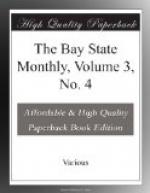Judge Phillips and his excellent wife took a lively interest in the studies of their ward. They examined him from time to time, not only in his catechism, which was then regularly taught, but also in respect of his literary efforts and acquirements. They encouraged him to make strenuous efforts to obtain a high rank as a scholar, speaker, gentleman, and Christian. Their labors were not lost. On leaving Andover, the youth was prepared to take an elevated stand in college, which he maintained to the completion of his course, when the honor of pronouncing the salutatory oration was conferred on him by the faculty.
Mr. Phillips chose the profession of the law, and soon gained an extensive practice. His popularity became such, that in 1794, he was invited to deliver the annual Fourth of July oration before the people of Boston. “This production,” says a writer, “bears the finest marks of intellectual vigor.” Some extracts from it have found their way into the school-books as models of eloquence.
In this same year Mr. Phillips was married to Miss Sally Walley, daughter of Thomas Walley, Esq., a respectable merchant of Boston. On the establishment of the Municipal Court in Boston, in 1800, he was made public prosecutor, and in 1803 was chosen representative to the General Court. The next year he was sent to the Senate, and such was the wisdom of his political measures, and the dignity of his bearing towards all parties, that he continued to hold a seat in this body every successive year until his decease, always discharging his duties, either as a debater or in the chair, to which he was ten times called, most creditably to himself as well as most acceptably to his constituents and the State.
In 1809 Mr. Phillips was appointed judge of the Court of Common Pleas. Three years later he was elected a member of the corporation of Harvard College, and in 1820 a member of the convention for the revision of the State Constitution. In this able and dignified body he held a conspicuous rank. His remarks upon the various questions which arose were learned, judicious, and sometimes rendered all the more effective by the flashes of his wit. Speaking, for example, on the third article of the Bill of Rights, he said he hoped they would not be like the man whose epitaph was, “I am well, I would be better, and here I am.”
The next year the town of Boston, which then contained nearly forty-five thousand inhabitants, began to agitate in good earnest the question of adopting a city government. A committee of twelve, of which Mr. Phillips was chairman, drew up and reported a city charter for the town, which was adopted at a meeting held March 4, 1822, by a vote of 2,797 to 1,881. The result was formally announced on the 7th of the same month by a proclamation from Gov. Brooks.
The two prominent candidates for the office of mayor were Harrison Gray Otis and Josiah Quincy, both men of high accomplishments and enjoying a large share of public confidence. But after a vote had been taken, resulting in no choice of mayor, the friends of these gentlemen suddenly agreed on Mr. Phillips, who at the town-meeting held on the 16th of April, 1822, received 2,500 out of 2,650 votes, and thus became the first mayor of the city of Boston.




